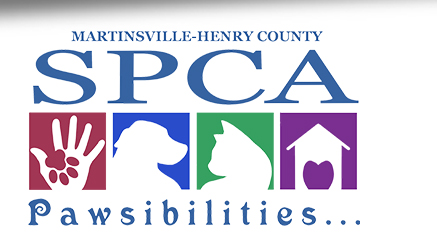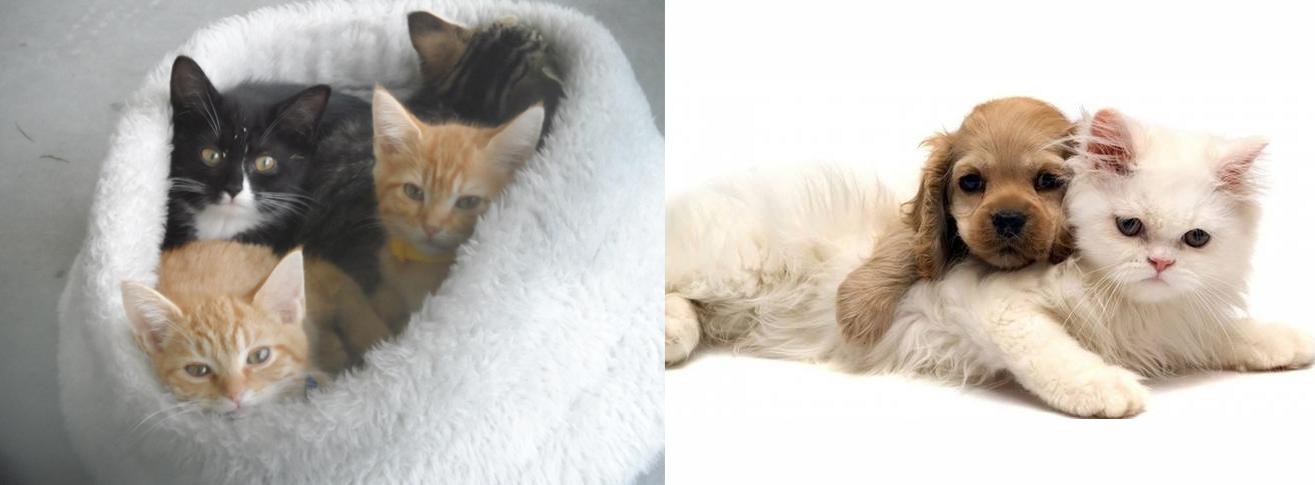Surrendering an Animal
“I can’t keep my pet”
The SPCA is a limited intake facility for dogs and cats.
What this means is that we simply do not have the space to take every unwanted animal brought to our shelter. If you find it absolutely necessary to rehome your animal and you have made every effort to do so yourself, please call us at (276) 638-7297 to check available space and schedule an evaluation appointment. Please bring any vet records that you may have or contact information about your pet’s veterinarian. When you arrive for your evaluation appointment your dog will be tested for heartworm disease. If your dog tests positive we will be unable to accept it. The SPCA does not have the funding to treat heartworm disease. Your cat will be tested for feline AIDS, feline Leukemia and ringworm. If they are positive for any of these diseases we cannot accept them. We will also assess your animal’s temperament and determine whether or not it will be safe to house in the shelter.
The SPCA is a no-kill shelter, defined by the Virginia Federation of Humane Societies as a euthanasia rate below 10%.
Please come prepared to pay a relinquishment fee to help cover the cost of spay/neuter. It costs the SPCA approximately $350 per animal that we take in. The SPCA survives solely on contributions from the public and grants. All of the services that we provide are paid for by our generous supporters.
If you wish to surrender kittens and puppies we will require that you have the mother animal and father animal, if you own it, spayed or neutered. When surrendering kittens/puppies you will be asked to schedule and pay for the spay/neuter surgery at that time.
Intake Policy
Stray Animals
Stray animals found by the public within the MHC (Martinsville Henry County) service area will be scanned for microchip (125kHz frequency) identification, searched from tip of noise to tip of tail for identifying markers such as (but not limited to) tattoos, collars, tags etc. The animal will be behaviorally evaluated by MHCSPCA staff and accepted in shelter pending room/behavior evaluation. We will make reasonable efforts to contact the owner of any identified stray animal. If we cannot accept a stray animal, we will direct the finder to take the animal to Henry County Animal Control (HCAC) or Martinsville City Animal Control (MCAC).
Owned Animals
Animals relinquished by their owners would be admitted by MHCSPCA and scanned for microchip (125kHz frequency) identification based upon available space. These animals will not undergo stray holds and will be made available directly for adoption. Any animal brought to the MHCSPCA will be tested for heartworms (canines) or FIV/FeLV/heartworms (felines) which takes approximately 15 minutes. The owner should allow up to 45 minutes for the scheduled evaluation and will first be asked to complete a questionnaire regarding the pet’s history.
Provided that housing resources are available, “walk-ins” will be accommodated and the owner will be asked to complete the questionnaire while waiting for the next available opening in the relinquishment schedule. If the owner is unable or unwilling to wait, the SPCA will direct the owner to HCAC or MCAC.
If an owned animal is brought to MHCSPCA after/before the Society’s regular hours but at a time when staff may still be on site, the owner will be asked to contact MHCSPCA staff during the Society’s regular business hours to make a relinquishment appointment.
If the pet is determined to be adoptable/healthy or within the means of provisional care, the pet will be admitted to MHCSPCA based on space.
For pets that are found to be behaviorally unmanageable, owners will be directed to seek training or contact HCAC or MCAC.
Alternatives When Housing is at Capacity
During certain periods, especially the summer, animal-housing resources for owner relinquished cats, may be unavailable. During these periods, affected owners will be provided alternative options including contact information for other local private animal shelters and rescue groups that may be able to assist in re-homing their pet.
Options Include:
If the animal is adoptable/healthy:
The Owner will continue to maintain the animal temporarily and check back periodically with MHCSPCA to determine when housing resources become available.
If the animal is treatable (i.e., rehabilitate/manageable) OR unhealthy/untreatable:
The owner will obtain necessary veterinary or behavioral treatment and continue to maintain the animal temporarily until the condition is resolved, or until MHCSPCA housing resources become available.
Deceased Animals
Animals that are deceased will be accepted by the organization. The individual requesting this service may enter through the side door of the Adoption Center.
Deceased animals found by the public within the MHC (Martinsville Henry County) service area will be scanned for microchip (125kHz frequency) identification, searched from tip of noise to tip of tail for identifying markers such as (but not limited to) tattoos, collars, tags etc. We will make reasonable efforts to contact the owner of any identified stray animal, as well, complete a STRAY NOTIFICATION, including the “finders” address /phone and immediate contact information.
Duration of Stay Agreement
The behavior and medical condition of each animal admitted to MHCSPCA adoption program will be re-evaluated during the animal’s stay. If an animal’s condition changes, the animal may be determined to be rehabilitative, manageable or unhealthy/untreatable (or Society’s equivalents).
If an animal housed at MHCSPCA is not meeting the Society’s adoption criteria during its stay, it will be placed on the Watch List & Notification Board for review and initiation of appropriate rehabilitation, alternative placement, or euthanasia in accordance with the SPCA Euthanasia Policy.
Alternative options will be reasonably explored for animals initially accepted by MHCSPCA for adoption, but that fail to continue to meet the adoptability criteria. Some examples of options include, but are not limited to: medical or behavioral rehabilitation within the limited resources of the Shelter, cooperation with other placement entities, assistance with appropriate foster care, return of the pet to the previous owner, or adoption of the pet with a medical or behavior waiver.
The MHCSPCA Receiving Manager, or assigned representative, is responsible for making reasonable efforts to contact the previous owner of any relinquished pet admitted to SPCA if, at the time the animal was relinquished, that owner requested to be contacted prior to negative outcomes such as Euthanasia. All findings will be discussed in detail with the owner by appointment with a member/volunteer of either the MHCSPCA Behavior and Training staff, or the Veterinarian when appropriate.
Definitions:
Healthy Healthy animals are those animals eight weeks of age or older (or, for the purposes of this policy, weaned and eating on their own) that, at or subsequent to the time the animal is taken into possession, have manifested no signs of a behavioral, or temperamental defect that could pose a health or safety risk or otherwise make the animal unsuitable for placement as a pet, and have manifested no sign of disease, injury, congenital or hereditary condition that affects the health of the animal, or that is likely to affect the animal’s health in the future.
Treatable – Rehabilitate Those animals under the age of eight weeks (not weaned and eating on their own) or those animals found to have a treatable medical, congenital or hereditary condition that poses no known significant health or safety risk to itself, other animal or the public and that will require treatment that is within reasonable resources of the Society or Department and/or the adopting owner within our community; and that would restore the pet’s health to an adoptable/healthy state. The medical prognosis must be fair to good to meet this definition.
Treatable - Unrehabilitatable Those animals found to have a manageable behavior condition or medical, congenital or hereditary condition that poses no known significant health or safety risk to itself, other animals, or the public and require long-term or lifelong monitoring for treatment, continued treatment or intervention that is within reasonable resources of the Society or Department and/or owner in our community, and allows the pet to maintain a satisfactory quality of life. The medical and behavioral prognosis must be fair to good to meet this definition.
Untreatable Those animals either exhibiting or having an established history of a terminal illness, significant combination or chronic conditions (medical & behavioral), a history of aggression to humans, other animals or themselves, or gross under-socialized behavior. The medical or behavior prognosis would be poor, guarded or grave to meet this definition.
Prediction of the probable course of a disease or condition in an individual and the chances of recovery.
Good: Favorable outcome is expected and / or maybe easily managed.
Fair: Favorable outcome possible and / or manageable.
Guarded: Possible outcome is unknown.
Poor: Non-favorable outcome is expected.
Grave: Death is imminent.
“Regulated” animals are prohibited or disqualified for adoption by law, regulation, or county /city policy. These include animals that are unlawful to possess, relinquished dogs with a documented history of dangerous behavior, and animals that have been classified by County or City as “dangerous dogs.”
A dangerous dog is defined as a dog that:
Has twice within a 48-month period attacked, bitten, or otherwise caused injury to a person engaged in lawful activity, or
Has once attacked, bitten, or otherwise caused injury to a person engaged in lawful activity, resulting in death or substantial injury.

